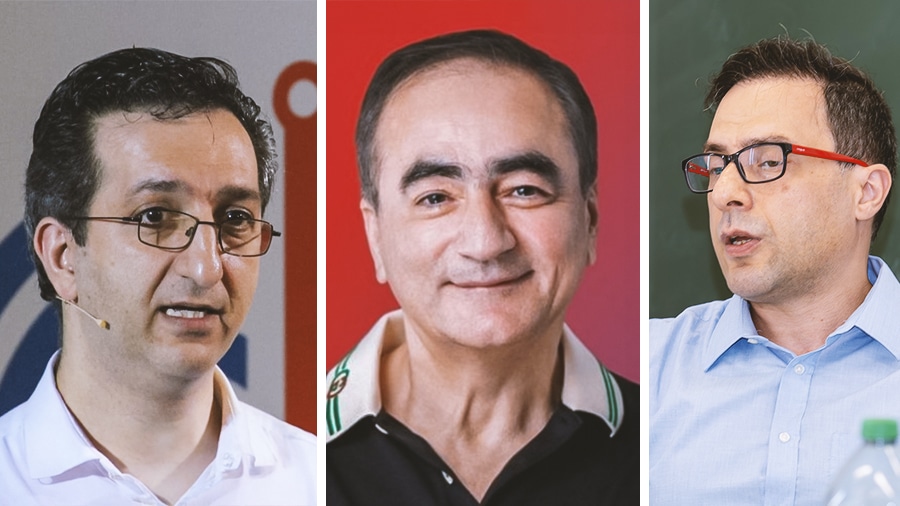Mehrdad Vahabi
Command Economy and its Place in the Political Economy of the Islamic Republic
Mohammad Maljoo
The Rise of Command Economy in the Field of Economic Production in Iran During the Last Decade
Moderator: Mazdak Daneshvar
The discussion explores the concept of a command economy in contemporary Iran and its implications within the context of Iran’s political and economic landscape. Two speakers, Mehrdad Vahabi and Mohammad Maljoo, present their views on the growing influence of command economy principles in Iran, with a particular focus on its rise in recent years. The session is moderated by Mazdak Daneshvar.
Mehrdad Vahabi: Command Economy and its Place in the Political Economy of the Islamic Republic
In his presentation, Mehrdad Vahabi critiques a group of economists who defend the reform of Iran’s command economy within the framework of the Islamic Republic. These economists, including well-known figures like Masoud Nili and Mousa Ghaninejad, have held key advisory roles in government and have been influential in major economic institutions such as the Statistical Center of Iran and the Management and Planning Organization. They have also contributed significantly to major economic publications and academic institutions like Sharif University.
According to Vahabi, these economists argue that the command economy is a byproduct of the influence of leftist ideologies in post-revolutionary Iran. They contend that such ideologies prioritized social justice at the expense of economic development, resulting in inefficiencies reminiscent of Soviet-style economies, with state control over pricing, persistent inflation, and a lack of optimal resource use.
Vahabi challenges this viewpoint, arguing that these economists neither fully understand Soviet-style economies nor accurately describe the command economy as it exists under the Islamic Republic. He also criticizes their proposed solution of replacing state intervention with a free-market economy, stating that they fail to recognize the true prerequisites for a functioning market economy. In his view, the so-called free-market approach advocated by these economists is insufficient to address the deep-rooted issues within Iran’s political and economic structure.
Mohammad Maljoo: The Rise of Command Economy in the Field of Economic Production in Iran During the Last Decade
The second speaker, Mohammad Maljoo, examines the recent rise of the command economy in Iran, particularly over the last decade, focusing on government intervention in key markets. These include the markets for consumer goods and services, energy, money, and foreign exchange. Maljoo’s central question is: why has the command economy expanded, especially in recent years?
Market-oriented economists argue that the Iranian government’s increased intervention is driven by a desire to achieve greater social justice. They claim that the expansion of state controls in the economy is an attempt to address inequality and improve social outcomes, but this effort has largely been unsuccessful.
Maljoo, however, offers a different explanation. He asserts that the recent expansion of the command economy is not a deliberate effort to promote social justice but rather an unintended consequence of political policies rooted in political Islam. According to Maljoo, these policies have, over time, led to increased state control over economic production, which has expanded the scope of the command economy. This is particularly evident in the last decade, where the state’s involvement in economic affairs has grown significantly.
Maljoo’s critique highlights the limitations of market-oriented explanations and focuses on the deeper political and ideological forces that have shaped Iran’s economic trajectory. He argues that the rise of the command economy is linked to the broader political shifts in the country, particularly the expansion of political Islam, which has influenced economic policy in ways that go beyond simple economic considerations.
The session highlights two critical perspectives on the command economy in contemporary Iran. Mehrdad Vahabi critiques the mainstream economists’ view that Iran’s economic problems stem from leftist ideologies and calls into question their faith in free-market solutions. On the other hand, Mohammad Maljoo explores the political and ideological roots of the command economy, focusing on the unintended consequences of political Islam on economic production.
Together, these presentations provide a nuanced understanding of the command economy in Iran, revealing the complex interplay between politics, ideology, and economics in shaping the country’s economic landscape. The speakers challenge both the free-market approach and simplistic explanations of government intervention, offering deeper insights into the structural issues underlying Iran’s economic challenges.



